vegan weight loss meal plan pdf
A well-structured vegan weight loss meal plan offers a sustainable path to shedding pounds through nutrient-dense, plant-based foods, proper hydration, and portion control, with resources like downloadable PDF guides available․
What is a Vegan Weight Loss Meal Plan?
A vegan weight loss meal plan is a structured guide offering plant-based recipes and portion-controlled meals designed to promote sustainable weight reduction․ It focuses on whole, nutrient-dense foods like fruits, vegetables, legumes, and whole grains, while avoiding animal products․ The plan often includes calorie-conscious options, high-protein ingredients, and balanced macronutrients to support metabolism and satisfaction․ Many plans are available as downloadable PDFs, providing organized schedules and grocery lists․ By emphasizing natural, unprocessed foods, a vegan weight loss meal plan encourages healthy eating habits and long-term lifestyle changes, rather than quick fixes․
Importance of Meal Planning for Weight Loss
Meal planning is crucial for successful weight loss, as it provides structure, ensures balanced nutrition, and helps maintain portion control; By mapping out meals in advance, individuals can avoid impulsive, unhealthy choices and stay committed to their goals․ A well-planned vegan meal plan promotes a calorie deficit while nourishing the body with essential nutrients․ It also reduces the risk of overeating and ensures consistency, which are key factors in sustainable weight loss․ Additionally, meal planning fosters accountability and makes healthy eating easier, especially with resources like downloadable PDF guides that offer organized schedules and recipes tailored to vegan weight loss needs․
Benefits of a Plant-Based Diet
A plant-based diet offers numerous benefits, including reducing the risk of chronic diseases like heart disease, diabetes, and certain cancers․ It promotes weight management by emphasizing high-fiber, nutrient-dense foods that boost satiety and metabolism․ Plant-based eating also supports environmental sustainability and ethical practices․ By focusing on whole, unprocessed foods, individuals can maintain a balanced intake of essential vitamins, minerals, and antioxidants․ This approach not only aids in weight loss but also enhances overall well-being, making it a sustainable and holistic choice for long-term health․

Key Components of a Vegan Weight Loss Meal Plan
A vegan weight loss plan focuses on calorie balance, high protein, fiber-rich whole foods, healthy fats, and hydration, ensuring nutrient-dense meals for sustainable weight management․
Understanding Calorie Needs
Calorie needs vary based on age, gender, weight, and activity level, with a typical vegan weight loss plan ranging from 1,200 to 1,800 calories daily․ A well-planned vegan meal ensures a calorie deficit while providing satiety through whole, nutrient-dense foods․ Portion control and balanced macronutrients are crucial for sustainable weight loss․ Consulting a dietitian helps tailor calorie intake to individual goals, ensuring adequate nutrition and energy levels throughout the day․
Protein Sources in a Vegan Diet
Plant-based diets offer abundant protein sources like legumes, beans, lentils, tofu, tempeh, and edamame․ Whole grains, nuts, seeds, and plant-based milks also contribute to daily protein intake․ Incorporating quinoa, chia seeds, and spirulina enhances protein variety․ Vegan meal plans emphasize combining foods to meet protein needs, ensuring muscle maintenance and satiety․ Meal prep with these ingredients supports weight loss goals while keeping meals delicious and nutritious, making it easy to stay on track with a balanced vegan lifestyle․
Role of Fiber and Whole Foods
Fiber-rich whole foods are cornerstone to vegan weight loss, promoting satiety and digestion․ Incorporating vegetables, fruits, whole grains, and legumes ensures sustained energy and nutrient absorption․ These foods prevent overeating, stabilize blood sugar, and support gut health, crucial for metabolism․ Meal plans emphasize unprocessed ingredients to maintain fiber intake, aiding in natural weight management and overall well-being, while keeping meals satisfying and diverse for long-term success on a plant-based diet․
Healthy Fats and Their Importance
Healthy fats are essential in a vegan weight loss meal plan, providing energy and aiding in nutrient absorption․ Sources like avocados, nuts, seeds, and olive oil support heart health and satiety․ These fats help reduce cravings, enhance flavor, and maintain cell function․ Incorporating them balances meals, preventing extreme calorie cuts and ensuring satisfaction․ Plant-based fats are crucial for long-term weight management, supporting hormonal balance and overall well-being․ They make meals more enjoyable while keeping you nourished and focused on your weight loss goals․
Hydration and Its Impact on Weight Loss
Hydration is vital for successful weight loss on a vegan meal plan․ Water aids digestion, boosts metabolism, and suppresses appetite, preventing overeating․ Even mild dehydration can slow metabolism and reduce energy levels․ Drinking plenty of water supports the body in burning fat efficiently and helps maintain a healthy gut, which is crucial for nutrient absorption․ Incorporating herbal teas, fresh juices, and water-rich foods into your diet enhances hydration․ Staying hydrated ensures your body functions optimally, making your weight loss journey smoother and more sustainable while following a plant-based lifestyle․
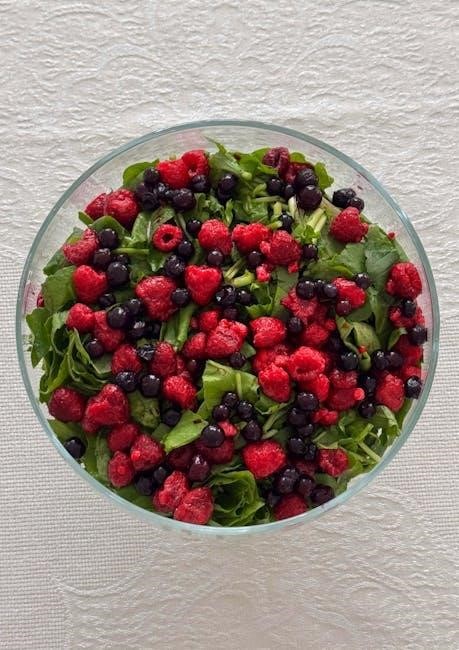
Sample 7-Day Vegan Meal Plan
A 7-day vegan meal plan provides a structured approach to weight loss, offering balanced, nutritious meals with variety and flexibility to support your dietary goals effectively․
Day 1: Breakfast, Lunch, Dinner, and Snacks
Start your day with avocado toast topped with hemp seeds and cherry tomatoes, providing healthy fats and protein․ Mid-morning, enjoy an apple pie smoothie made with plant-based milk․ For lunch, a vibrant Buddha Bowl with quinoa, roasted vegetables, and tahini dressing offers a nutrient-packed meal․ In the afternoon, snack on hummus with veggie sticks; Dinner features stir-fried vegetables with brown rice and a light drizzle of soy sauce․ End the day with dark chocolate and mixed nuts for a satisfying treat․ Stay hydrated with water and herbal tea throughout the day․
Day 2: Balanced Nutrient Intake
Begin with a hearty oatmeal bowl topped with fresh berries, chia seeds, and a drizzle of maple syrup for sustained energy․ Mid-morning, snack on carrot sticks with hummus․ Lunch features a Powerhouse Bowl with mixed greens, roasted sweet potatoes, chickpeas, and a lemon-tahini dressing․ In the afternoon, enjoy an apple with almond butter․ Dinner includes lentil stir-fry with broccoli, bell peppers, and brown rice․ End the day with herbal tea and a small portion of dark chocolate․ This meal plan ensures a balance of protein, fiber, and healthy fats, keeping you full and energized throughout the day․
Day 3: Incorporating Legumes and Grains
Start Day 3 with a protein-packed breakfast: chickpea scramble with spinach, garlic, and turmeric, served with whole-grain toast․ Mid-morning, snack on mixed nuts and dried fruit․ Lunch features a hearty quinoa salad with black beans, corn, diced tomatoes, and avocado, dressed with lime and cumin․ In the afternoon, enjoy a smoothie blended with banana, spinach, and plant-based milk․ Dinner includes lentil and vegetable curry with a side of brown rice․ End the day with a small serving of cinnamon-spiced apple slices․ This day emphasizes legumes and whole grains for sustained energy and nutrient-rich meals․
Day 4: High-Protein Options
On Day 4, focus on high-protein meals to support muscle growth and satiety․ Breakfast includes tofu stir-fried with kale and turmeric, served over brown rice․ Mid-morning, enjoy a smoothie bowl with protein-rich chickpeas, banana, spinach, and almond butter topping․ Lunch features a hearty lentil and vegetable stew with quinoa․ For a snack, choose edamame or a handful of nuts․ Dinner highlights tempeh stir-fried with broccoli, bell peppers, and soy sauce, served with wild rice․ This day’s meals are designed to keep protein levels high while maintaining a balanced and satisfying vegan diet․
Day 5: Low-Calorie but Nutrient-Dense Meals
Day 5 focuses on nutrient-dense, low-calorie meals to support weight loss while maintaining satisfaction․ Breakfast features a green smoothie with spinach, chia seeds, and almond milk․ Mid-morning, enjoy sliced cucumber and carrots with hummus․ Lunch includes a Buddha bowl with mixed greens, roasted vegetables, chickpeas, and citrus vinaigrette․ For a snack, opt for baby bell peppers and cherry tomatoes․ Dinner consists of steamed vegetables with a side of brown rice and a small avocado portion․ These meals are crafted to provide essential nutrients while keeping calorie intake in check․
Day 6: Meal Prep Ideas
Meal prepping is a game-changer for consistent weight loss․ Start with batch cooking grains like quinoa and brown rice․ Chop fresh veggies for salads and stir-fries․ Portion out overnight oats for quick breakfasts․ Prepare lentil or vegetable soups in bulk, freezing for later․ Marinate tofu or tempeh for easy dinners․ Pack snacks like mixed nuts, seeds, and fruit․ Create a grocery list to ensure you have all ingredients․ This strategy saves time, reduces food waste, and keeps you on track with balanced, nutrient-dense meals throughout the week, supporting your weight loss goals effectively․
Day 7: Refreshing and Light Meals
End your week with light, refreshing meals that nourish your body․ Start with chia pudding topped with fresh berries and a drizzle of maple syrup․ For lunch, enjoy a vibrant Buddha Bowl with mixed greens, cherry tomatoes, cucumber, and a citrus vinaigrette․ Dinner could be a vegetable stir-fry with tofu, served with a side of steamed broccoli․ Snacks include sliced bell peppers with hummus or a refreshing fruit salad․ These meals are designed to be easy on the digestive system while providing essential nutrients․ Incorporate herbal teas or infused water for extra hydration, supporting your weight loss journey naturally and sustainably․
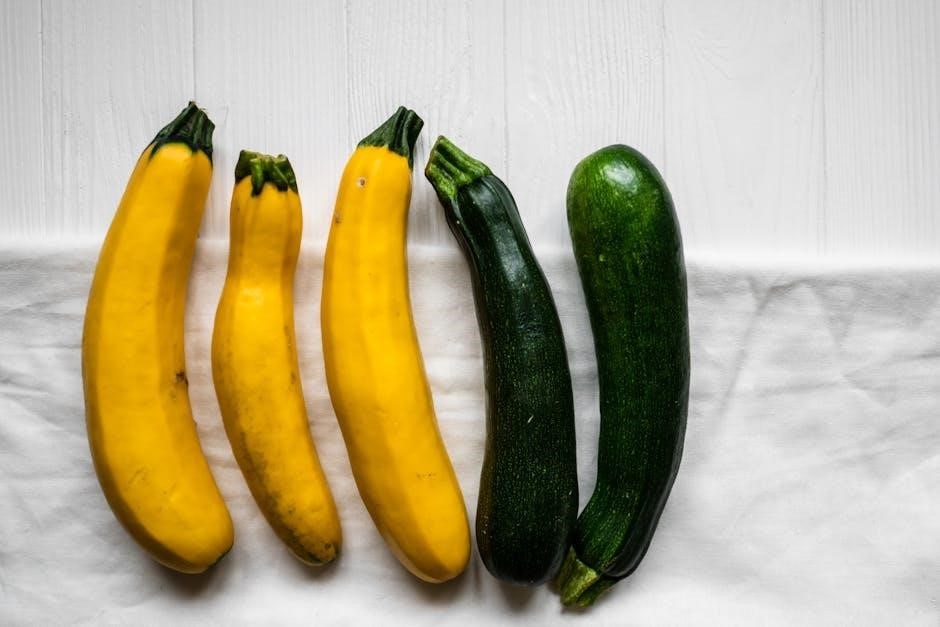
Common Concerns and Solutions
Concerns about cost, cooking skills, and dining out are addressed with budget-friendly plans, simple recipes, and restaurant options, ensuring a smooth vegan weight loss journey․
Is a Vegan Meal Plan Expensive?
A vegan meal plan doesn’t have to be costly․ Plant-based ingredients like beans, grains, and vegetables are generally affordable․ While vegan substitutes can be pricier, they’re often optional․ Many meal plans focus on whole foods, making them budget-friendly․ Planning meals and using ingredients efficiently can also reduce costs․ Additionally, resources like downloadable PDF guides often include budget-friendly recipes and tips, helping you stay within your means while enjoying delicious, healthy meals․ This approach ensures that a vegan diet is accessible and economical for everyone․
Do I Need Cooking Expertise?
Cooking expertise is not required for a vegan weight loss meal plan․ Simple, quick recipes are designed to be accessible for all skill levels․ While planning and preparation are necessary, the process is straightforward․ Many meal plans, like the 21-Day Weight Loss Solution, provide easy-to-follow instructions and delicious recipes․ If you prefer minimal cooking, meal prep options are available to streamline the process․ The focus is on healthy, whole foods, making it easy to prepare nourishing meals without advanced culinary skills․ This ensures everyone can enjoy a sustainable and effective weight loss journey․
Can I Eat Out on a Vegan Diet?
Eating out on a vegan diet is entirely possible with some planning․ Many restaurants now offer vegan options or can modify dishes to suit plant-based preferences․ It’s important to communicate clearly with your server about your dietary needs․ Opting for whole, nutrient-dense foods like salads, vegetable-based dishes, or legume-rich meals ensures alignment with your weight loss goals․ However, be mindful of calorie intake and avoid processed or high-calorie options․ Always check the menu in advance to make informed choices that support your health and weight management objectives while enjoying dining out․ This flexibility makes vegan living sustainable and enjoyable․
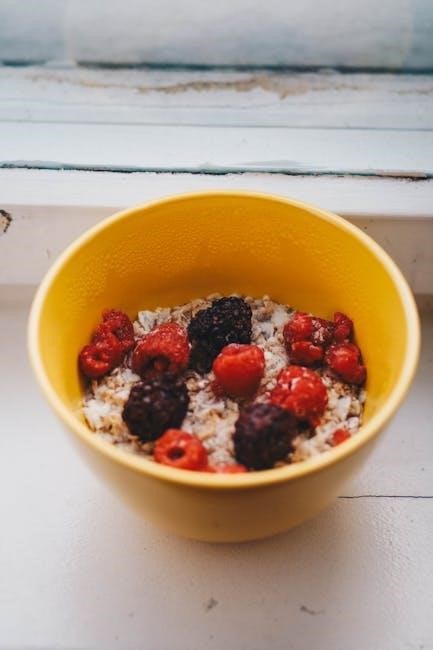
Research and Studies
Studies highlight the effectiveness of vegan diets for weight loss, with research published in the Journal of the American College of Nutrition supporting their benefits for health and sustainability․
Comparison with Other Diets (e․g․, Mediterranean)
A study in the Journal of the American College of Nutrition compared a whole food plant-based diet with the Mediterranean diet over 16 weeks․ Participants on the vegan plan showed greater weight loss and improved health markers, such as reduced cholesterol and blood pressure, compared to those on the Mediterranean diet․ The vegan diet’s emphasis on whole, minimally processed foods contributed to its success․ These findings suggest that a well-planned vegan meal plan can be more effective for weight loss and overall health compared to other popular diets․
Scientific Backing for Vegan Weight Loss
Research supports the effectiveness of vegan diets for weight loss․ A 16-week study in the Journal of the American College of Nutrition found that participants following a whole food plant-based diet lost more weight and showed greater improvements in health markers compared to those on a Mediterranean diet․ Vegan diets are high in fiber and low in saturated fats, promoting satiety and reducing calorie intake․ They also tend to be rich in antioxidants and essential nutrients, contributing to overall health․ This scientific evidence underscores the potential of vegan meal plans as a sustainable and healthy approach to weight management․
Success Rates and Case Studies
Case studies highlight the effectiveness of vegan meal plans for weight loss․ Many individuals report significant weight reduction, with one person losing 125 pounds by transitioning to a plant-based diet․ A 21-Day Weight Loss Solution program has helped numerous participants achieve their goals, emphasizing whole foods and balanced nutrition․ These success stories demonstrate that consistent adherence to a well-structured vegan plan can lead to sustainable weight loss and improved overall health, making it a viable option for those seeking long-term results․ The combination of nutrient-dense meals and lifestyle changes often results in transformative outcomes for participants․
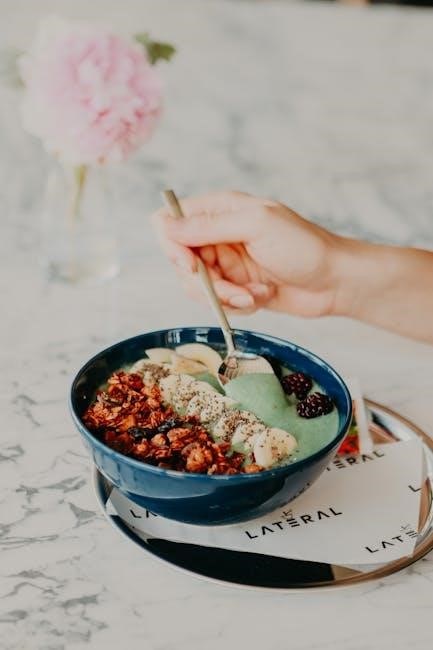
Success Stories and Testimonials
Many individuals have achieved significant weight loss and improved health through vegan meal plans․ Testimonials highlight transformative results, with one person losing 125 pounds and reversing chronic conditions․
Real-Life Examples of Weight Loss
Individuals following vegan weight loss meal plans have reported remarkable results․ One testimonial shares a 125-pound weight loss journey, transitioning from a Standard American Diet to a whole food plant-based lifestyle․ This change not only led to significant weight reduction but also reversed chronic health issues like high blood pressure and high cholesterol․ Many users of the 21-Day Weight Loss Solution highlight how structured meal plans and delicious recipes helped them stay consistent and achieve their goals; These real-life examples demonstrate how a well-planned vegan diet can lead to sustainable weight loss and improved overall health, inspiring others to adopt a similar approach․
Before and After Transformations
Remarkable before and after transformations highlight the effectiveness of vegan weight loss meal plans․ Many individuals share their journeys, showcasing significant weight loss and improved health․ One notable example is a 125-pound weight loss, where adopting a whole food plant-based diet reversed chronic conditions like high blood pressure and cholesterol․ These transformations not only reflect physical changes but also mental and emotional well-being․ The structured approach of meal plans, such as the 21-Day Weight Loss Solution, provides clear guidance, helping users achieve and maintain their weight loss goals․ These inspiring stories demonstrate the lasting impact of a well-planned vegan lifestyle on overall health and vitality․
Interviews with Successful Dieters
Interviews with individuals who have successfully followed a vegan weight loss meal plan reveal their personal journeys and strategies․ Many dieters emphasize the importance of whole, nutrient-dense foods and consistent hydration․ They share how structured meal plans, such as the 21-Day Weight Loss Solution, helped them stay on track and avoid hunger․ These testimonials highlight the sustainable nature of a plant-based diet, with dieters often reporting improved energy levels and overall health․ Their stories serve as motivation, proving that a well-planned vegan lifestyle can lead to lasting weight loss and enhanced well-being for those committed to the journey․
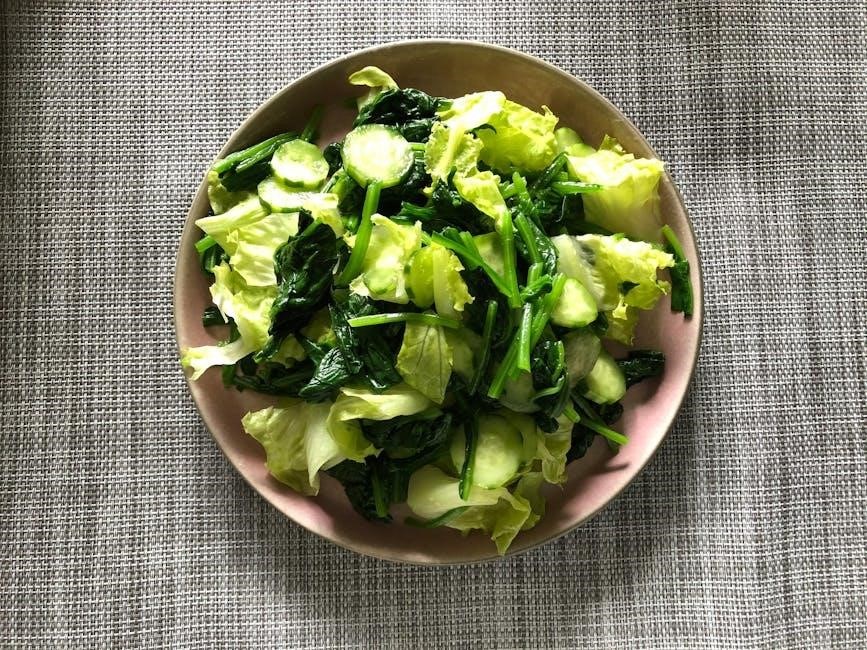
Maintaining Weight Loss Long-Term
Maintaining weight loss long-term involves adopting sustainable habits, such as consistent meal planning, mindful eating, and regular physical activity․ A balanced, whole-food vegan diet supports lasting results․
Strategies for Sustained Weight Management
Long-term weight management requires consistent habits, such as meal prepping, hydration, and mindful eating․ Incorporate whole, unprocessed foods and avoid calorie-dense snacks․ Regular physical activity boosts metabolism, while portion control prevents overeating․ Stay hydrated with water or herbal teas to support digestion and appetite regulation․ Avoid processed foods high in sugar and unhealthy fats․ Track progress through journaling or apps to maintain accountability․ A plant-based diet is naturally cost-effective and nutritious, ensuring a sustainable weight management plan․ Focus on gradual, healthy changes rather than quick fixes for lasting results․
Overcoming Plateaus
Plateaus are common in weight loss journeys, but they can be overcome by adjusting calorie intake, increasing physical activity, or modifying meal plans․ Incorporate strength training to build muscle, which boosts metabolism․ Rotate protein sources and vary meal compositions to ensure nutrient diversity․ Stay hydrated to enhance digestion and energy levels․ Reassess portion sizes and track intake to avoid unintended calorie surpluses․ Introduce new recipes or ingredients to keep meals interesting and prevent boredom․ Patience and consistency are key, as progress may slow but can be reinvigorated with these strategies, ensuring continued success on a vegan weight loss plan․
Mental and Physical Well-being
A vegan weight loss meal plan promotes both mental and physical health by focusing on whole, nutrient-rich foods․ These foods support energy levels and mood stability, reducing stress and anxiety․ A balanced plant-based diet provides essential vitamins and minerals, such as vitamin B12 and iron, which are crucial for brain function and overall well-being․ Regular hydration and fiber intake improve digestion, while antioxidants from fruits and vegetables protect against chronic diseases․ This holistic approach not only aids in weight loss but also enhances mental clarity and emotional resilience, fostering a healthier, more balanced lifestyle․ Consistency is key to long-term benefits․

A vegan weight loss meal plan offers a sustainable, healthy path to shedding pounds․ Downloadable PDF guides provide structured plans, recipes, and expert tips for successful weight management and wellness․
Final Thoughts on Vegan Weight Loss
Embracing a vegan weight loss meal plan can transform your health journey, offering sustainable results through nutrient-rich, plant-based foods․ By focusing on whole grains, legumes, fruits, and vegetables, you create a balanced diet that supports weight management and overall well-being․ Studies show that a well-planned vegan approach not only aids in shedding pounds but also reduces the risk of chronic diseases like heart disease and diabetes․ With resources like downloadable PDF guides, achieving your goals becomes easier․ Remember, consistency and patience are key to long-term success in your vegan weight loss journey․
Downloadable Meal Plan PDF
Accessing a downloadable vegan weight loss meal plan PDF simplifies your journey, offering structured guidance with daily recipes, portion sizes, and grocery lists․ These resources are designed to ensure you stay on track, providing variety and nutrition while keeping costs low․ Many PDFs include 7-day or 21-day plans, complete with step-by-step instructions and tips for meal prep․ By downloading a meal plan PDF, you gain a clear roadmap to achieving your weight loss goals without the hassle of meal planning, helping you focus on healthy, sustainable eating․